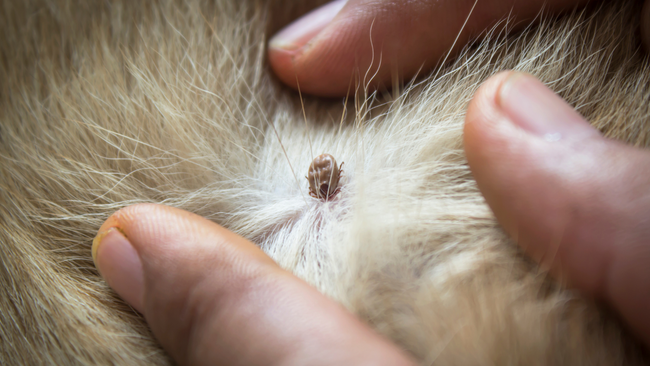|
North Carolina is no stranger to ticks. While they're most active from late spring to early fall, ticks are found all year long. Knowing information about ticks, how to prevent them around your home, how to protect yourself from bites, and what to do if you are bit can help keep you, your family, and your pets safe.
Preventing Ticks Around Your Property When ticks aren't attached to a host, they spend their time in moist soil or on tall grass and weeds. Be sure to keep these areas mowed or trimmed down around your home and property to reduce places for them to live. Keep playground equipment, decks, and patios away from yard edges and trees. Placing a three-foot-wide barrier of wood chips or gravel between lawns and wooded areas will restrict ticks from moving into recreational areas. Protecting You and Your Family From Ticks Spending time outside, walking your dog, camping, or gardening could bring you in close contact with ticks. While outside, stay on wide, clear paths and avoid overgrown weedy areas. Whenever possible, wear long-sleeved shirts, long pants, and closed-toe shoes. Wearing dark clothing also makes you harder to spot. After spending time outdoors, always check yourself and your children for ticks. They can ride home on your clothing and pets and attach to a person later. Be sure to thoroughly inspect your hair, around the waist, under the arms, and the back of the knees. Preventing Ticks on Your Pets Unfortunately, dogs are prone to tick bites and tickborne diseases. It may be hard to detect bites on dogs, especially since it may be hard to see under their fur. Signs of a tickborne disease may not appear for seven to 21 days or longer after a tick bite. Watch your dog closely for changes in behavior or appetite if you suspect they were bit. When checking for ticks on your dog, pay extra attention between the toes, around the tail, under the collar, and in the ears. It's important to talk with your veterinarian about the best tick prevention products for your dog. What To Do If You're Bit By a Tick If you do find a tick attached to your skin, don't panic.
Symptoms of Tickborne Illnesses The most common symptoms of a tick-related illness are fever/chills, aches, and pains, or a rash. In Lyme disease, the rash may appear within three to 30 days, generally before a fever. The rash seen with Rocky Mountain spotted fever varies significantly in appearance, location, and time of onset. Other symptoms include burning, itching, swelling, or vomiting. In addition to Lyme disease and Rocky Mountain Spotted Fever, there are more than a dozen other types of diseases that are transmitted through tick bites. A report from the North Carolina State Extension found that the blacklegged tick, the American dog tick, the brown dog tick, and the Lone Star tick are the most common ticks found in North Carolina. The Gulf Coast tick has also been found in the eastern North Carolina region.
These types of ticks can be prevented on your properties with service by Pestech of Greenville. Call us at 252-353-4760 to schedule a free consultation. Your East Coast exterminating professionals are honored to serve you with the utmost quality, care, and experience. Comments are closed.
|
|
|
HOW ARE WE DOING? (Google review embedded here)
Copyright © 2023
PESTECH OF GREENVILLE, INC.
PESTECH OF GREENVILLE, INC.



